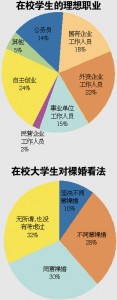China’s Post-90s Generation Optimistic About Country’s Future
Posted: 10/23/2014 9:05 amChinese born in the 1990s are more optimistic about the country’s political and economic future than those born in the 1950s to 1980s, claims a Fudan University Study. Oddly, however, the study also reports that those born in the 1990s showed the least amount of interest in issues related to justice and social equality.
Data collected over eight months and involving surveys of 1,800 online users was compiled into a report titled “Chinese Online Mentality Report”. Researchers studied users’ Weibo posts over a two year period and categorized them under headings such as social issues, social emotions, group identity, online behavior and social ideology, according to project leader, Dr. Gui Yong, a researcher with the University’s communications and state governance center.
The study found that 76.7 percent of post-90s online users were optimistic about the country’s political future, while 85.7 percent were confident about China’s economic prospects. By comparison, only 70.6 percent of post-80s online users said they were cautiously optimistic about the country’s political future.
The post-90s generation showed the lowest levels of negative emotion toward social inequality, social injustice, and issues related to officials, the rich, and technocrats. Not surprisingly, their posts included far fewer mentions of government and media Weibo accounts.
Again, perhaps not surprising, surfing the net and entertainment were at the top of the post-90s’ radar: 95.2 percent of the group used Weibo to record their life events; 92.8 percent like to express themselves emotionally on Weibo; and 92 percent use Weibo for fun, scoring the highest among the five generations.
People born in the 1960s approached social media fundamentally differently. They expressed disdain with the younger generation’s reliance upon social media to express themselves when it came to social issues. Predictably, those born in the 1960s (that used Weibo) dedicated most of their posts to public opinion leaders, government accounts and media accounts.
Those born in the 1970s dedicated the majority of their posts to housing prices, household registration, food, income, and employment. And while not terribly insightful, the study found that those born in the 1950s dedicated the majority of their posts to issues related to social security.















